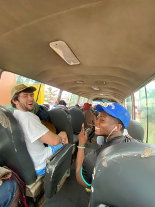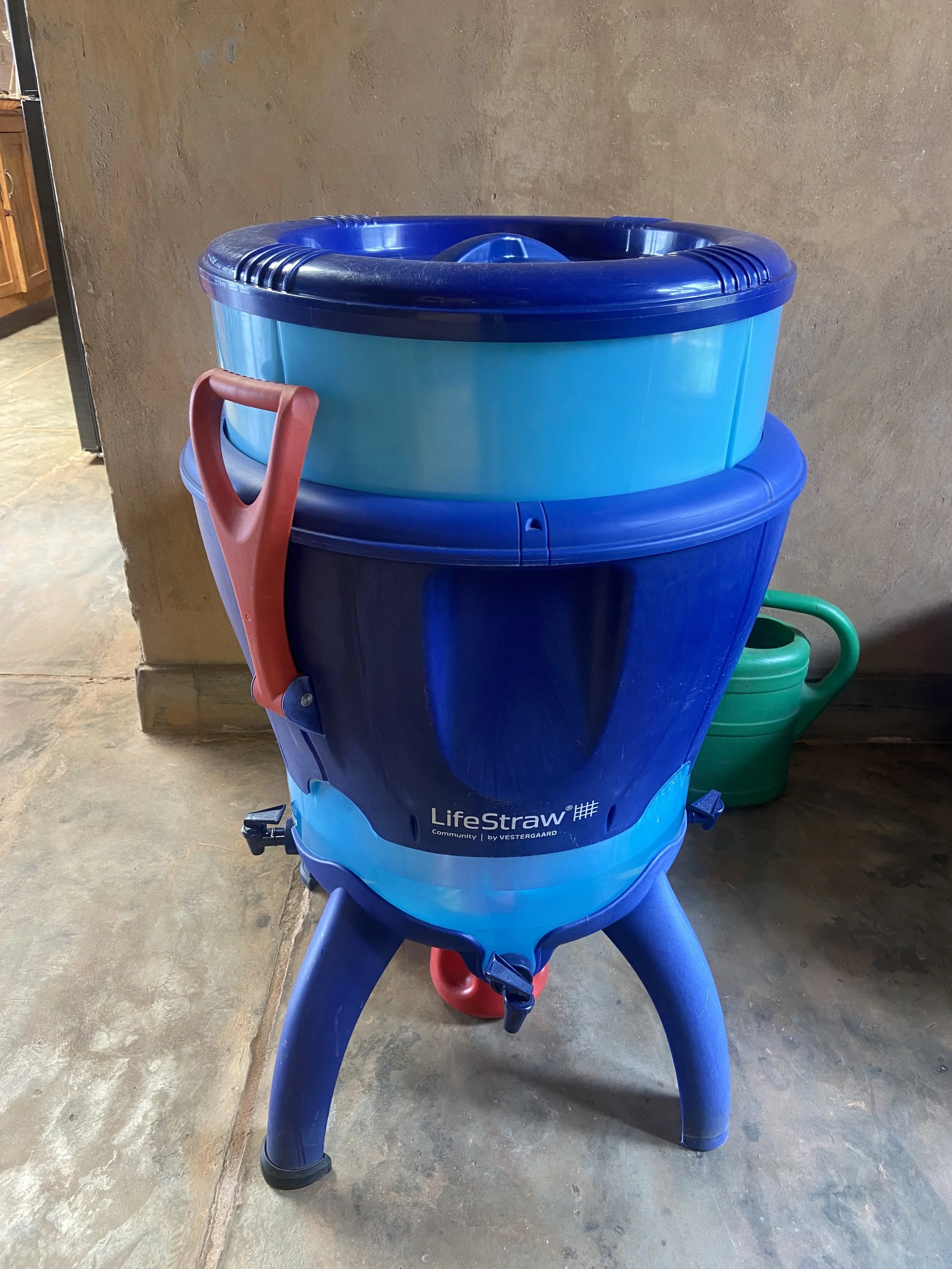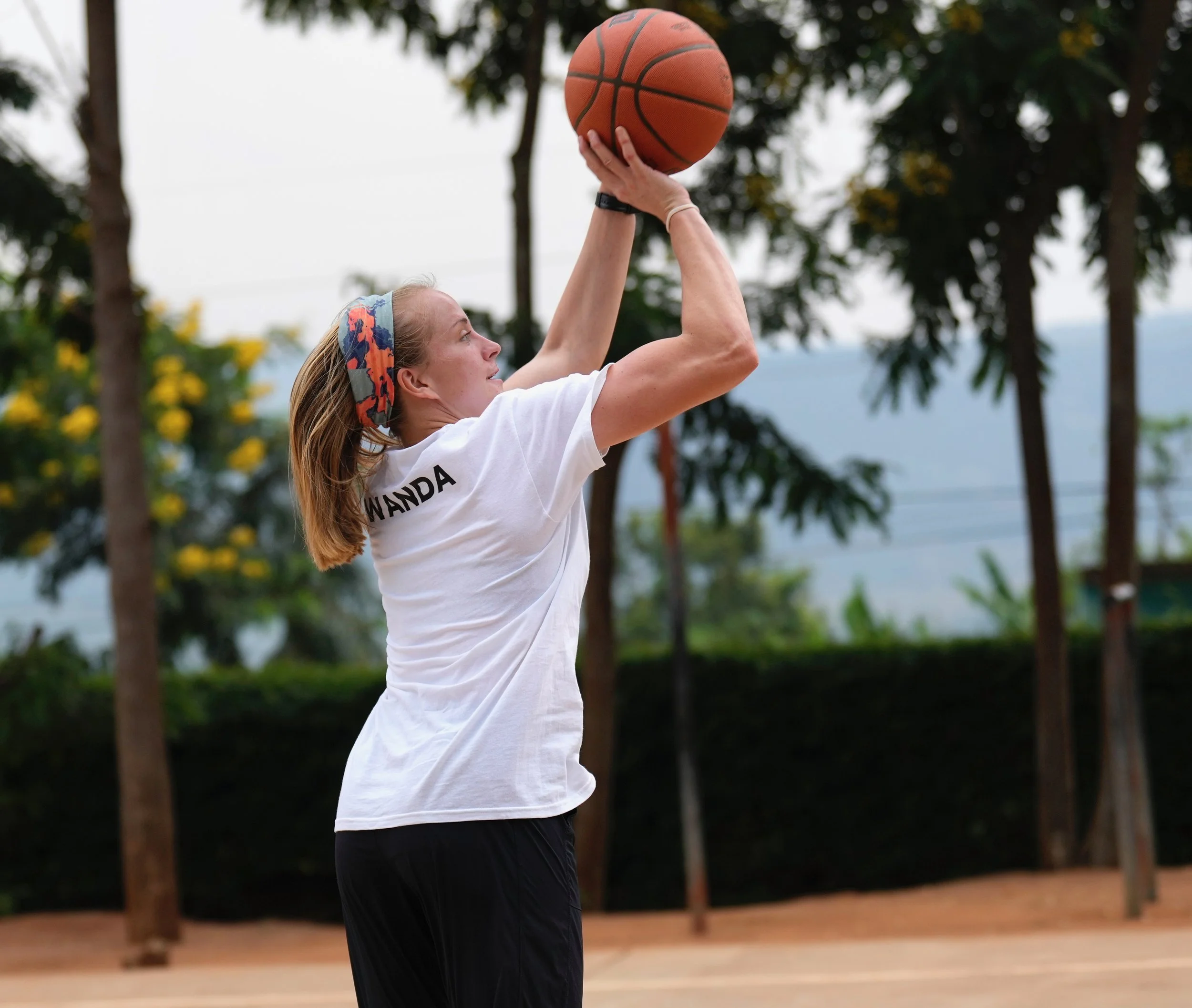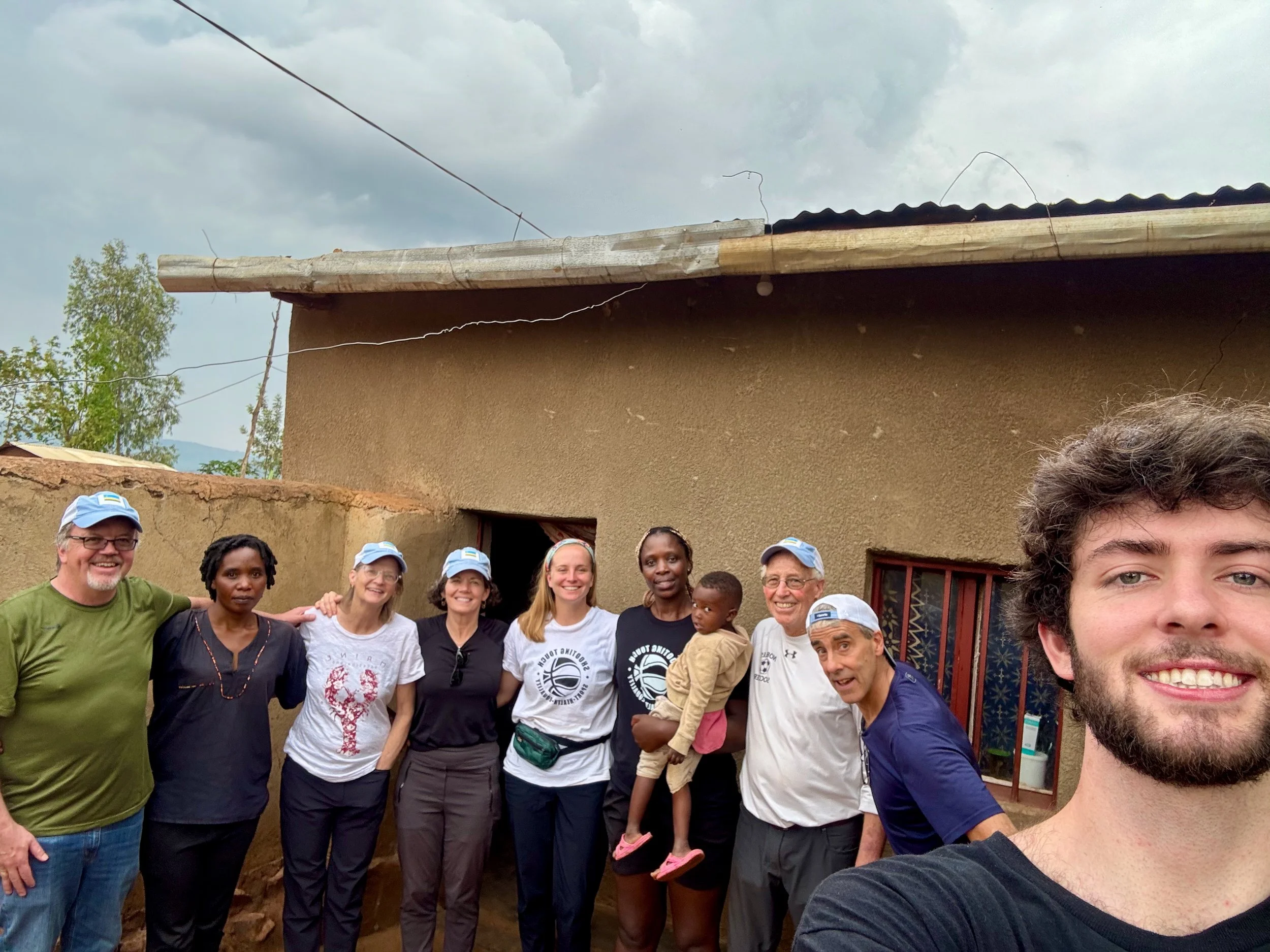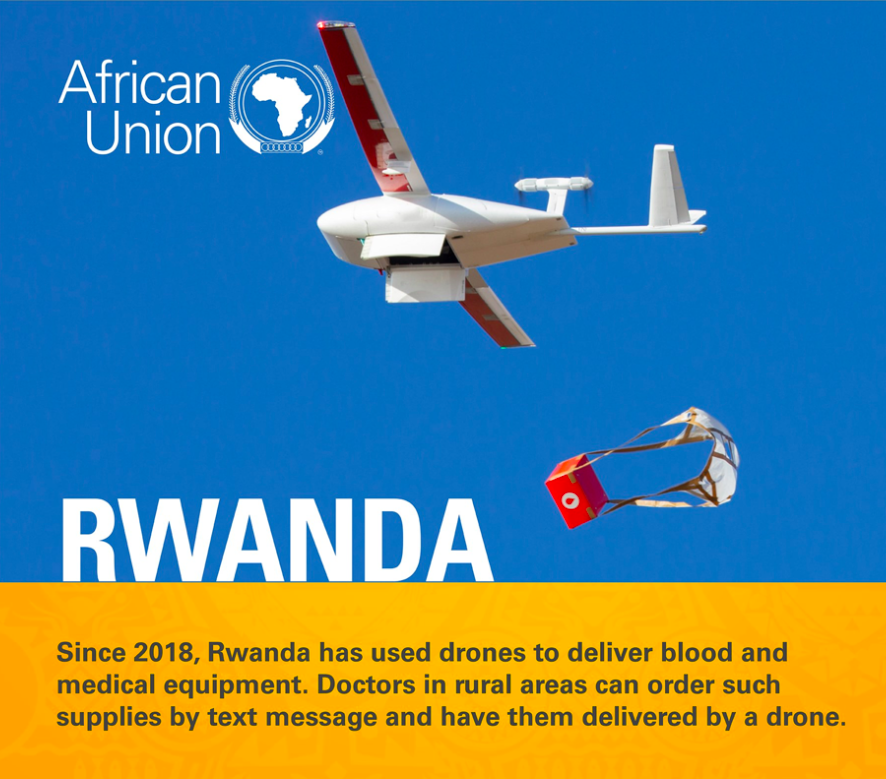Tuesday, January 28
11:10
This past Sunday, we headed on our first bus trip from Kigali to Rwinkwavu. Distance wise, the trip is roughly 51 miles, so you would assume it should take around an hour. Yet you know what they say about making assumptions…try at least three hours owing to the hilly, single-laned road, frequent and (what feels like) unplanned stops, and time spent waiting for the bus to fill up (most buses won’t leave until then). I did my best to make note of my surroundings and emotions, since I knew it would be my only opportunity to capture my first impression of the Rwandan public transport system. In doing so, I found myself reflecting on the numerous rice paddy fields we passed.
People were knee-deep out in the mud, working nonstop in the blazing heat. Witnessing this definitely put things in perspective and quieted my internal complaints about the hot, sticky, and cramped conditions of the bus ride. Plus, we were traveling across the country for under three dollars (you can’t even get a 5-minute ride with Uber at that rate back home).
Wednesday, January 29
13:45
If the past week has taught me anything, it’s about the illusion of control. Those who know me, know that I’ve always been type A, in fact, borderline maniac when it comes to organization and order. Both making lots of international friends during my undergraduate/graduate studies and living overseas have exposed me to different ways of being and doing, and in effect, loosened me up a bit. Nevertheless, at the core, I’m still me – a complicated mixture of wanderlust and control. I love seeing new places, learning new cultures, trying new foods, and everything else that comes with the territory. Conversely, I crave routine, structure, and my own clean, organized space (physical, mental, emotional, etc.) to debrief and recharge. Needless to say, these two sides of me blend about as well as water and oil. Packing up and moving to a foreign country has suitably catered to my wanderlust side, while simultaneously defying every fiber of my control side. Here is a list of some of my more recent experiences where I’ve had zero control:
Having my own space
The timeline of finding a house in Mukarange
The time spent on buses to/from Kigali and Rwinkwavu
People bailing on plans last minute - often weather related, rain deters all outdoor movement here
The stability and strength of my phone’s hotspot connection when no wifi is available, which is 24/7, 3-6-5 at the Rwink house
The visa approval timeline - receiving a text from Immigration (in Kigali) that our visas are ready right as we arrive at the Rwink house (far from Kigali)
The list could go on endlessly, and it serves to highlight how little control we really have over things. My current ‘foreigner in a foreign place’ status is giving me ample opportunities to make a decision regarding instances like the ones listed above, either (a) stress over everything that doesn’t go as I’d expected or hoped or (b) focus on my response to how things actually play out. The latter choice is more beneficial for many reasons, yet not surprisingly, the harder one to put into practice. The times I have actively decided to focus on my reaction, which often entails laughing it off and commenting something along the lines of needing to “roll with the punches,” I not only feel like a better human, but I also feel more prepared to deal with future frustrations and uncertainties. For example, after feeling completely fed up with my unstable phone hotspot connection at the Rwink house and questioning its ability to load upcoming Zoom meetings, I decided to buy a portable Wi-Fi device while I was in Kigali collecting my visa. Rather than continue to moan about my connection, I found a solution, acted on it, and capitalized on an unexpected trip into Kigali.
Thursday, January 30
12:01
By staying open to other ways of doing and seeing things, I’ve come to terms with how little I really know. This past week, Chantal (house helper at Rwink) has shown me the ropes of how things work in the house, and as a result, I’ve been a constant source of humor (read: these foreigners wouldn’t stand a chance out here alone). Picture this: I’m walking down the hill with Chantal to the neighboring yard with the spicket where we collect our drinking water.
After filling up the (now really heavy) 20-liter plastic jerry can, I head back up the hill and nearly faceplant. I then enter the house, walk over to the 50-liter LifeStraw water purifier tank (see above), and proceed to spill the water all over the floor while trying to pour it into the small opening at the top. Chantal stops me, brings over a smaller cooking pot, and gracefully pours some water from the jerry can into the pot, and then from the pot into the tank. I promise that was my plan B.
Later, we headed to the market, where I was again humbled by how little I understand the way things work. Chantal walked around like an absolute boss, haggling down the initial prices (being overcharged is unfortunately a constant occurrence in my experience, as many Rwandans correlate expatriates with money), and getting us the produce we needed at local cost. While I could hardly think straight between the organized chaos of the market space and the potent smell of the massive piles of dried fish, Chantal whizzed us through the market with a familiarity that only being a local could explain. When in doubt, follow the (trusted) local.
Thursday, February 6
14:10
We just got back to the Rwink house after hosting visitors from the U.S. This was my first time engaging with donors (and friends of Shooting Touch) in a non-profit setting, and it’s safe to say I thoroughly enjoyed the experience. We started by forming a circle and introducing ourselves to the group, which included ST staff (Rwinkwavu ST coaches, Sam, and the Fellows) and the visitors. We were then asked by one of the visitors (a former professional sports photographer) if we could play a quick pickup game so that he could snap some pictures. Not surprisingly, our little PR session turned into a highly competitive, full-blown 30 minutes of basketball. This game served as the perfect icebreaker, as it was evident that we all shared a love for basketball/sport and experienced (once again) its ability to connect people.
After working up a good sweat, we split into two groups and headed to the homes of two Shooting Touch beneficiaries, Zelda and Esther. These women willingly opened their arms and doors (to people they just met), shared their life stories, and gracefully embraced some very vulnerable discussion topics. Reflecting on my group’s visit, I am amazed by Esther’s resilience and the positive outlook she maintains despite difficult living conditions and financial distress. Language barrier aside (shoutout to Denise for interpreting, that work is not easy), her gratitude toward ST radiated through her smile and entire body - at one point she even started singing and dancing in praise of ST. After physically seeing and hearing about the direct and positive impact of ST in Esther’s life, such as receiving health insurance for her entire family (five kids), accessing mental health counseling for herself, strengthening her social capital and cohesion, and developing into a leader in her community, I left her house feeling inspired to continue improving people’s lives through the systems and programs ST has in place. Esther also talked about how she has connected countless struggling women in her community to ST, demonstrating the ripple effect. Working in the sport-for-development sector (or any development sector) can be exhausting - as individuals, our efforts can sometimes feel futile when viewed against the larger, systemic issues of poverty and inequality (that are often exacerbated by a global, capitalist system). Yet speaking directly to beneficiaries provides an important reminder: improving one individual’s life impacts change at the community level, which can be a catalyst for change at the district and national levels in the long run when conducted sustainably and with clear strategic intent.
Thank you to Ben and his friends for being so friendly, inquisitive, respectful, and supportive throughout your visit, especially within Zelda and Esthers’ homes - Turikumwe!
Saturday, February 8
19:32
While staring up at another beautiful, starry night in Rwinkwavu, my peripheral caught a small, red light moving across the sky. A few weeks ago, I would have had no idea why I spot so many of these lights each night out in the village, but now, I know that they are drones delivering blood, as well as other routine and emergency medical supplies from distribution centers to district hospitals and rural health centers. These drones also deliver swine semen to increase livestock production and boost Rwanda’s food self-sufficiency. While they have become routine sightings for locals, I still get flooded with a mix of awe and relief every time I see one. I stand in awe of the life-saving capacity of technology, and relieved that, in this instance, it’s being used to do good. (If you’d like to read more about this topic, click here).
Saturday, February 15
15:42
Another week has flown by and I’m slowly catching on to the pace of life in Rwanda. After many viewings, I finally found a house in Mukarange thanks to the help of Coach Nico and Coach Delice. Navigating this process has required many things, including patience with the language barrier, openness to learning (and accepting) how leasing works in a different country, and trusting that the ST coaches are securing the best deal for me (i.e., that the landlord is not taking advantage of my expatriate status). The most notable difference in the process is that most landlords do not ‘finish’ houses here until they have a tenant who commits to a contracted lease period and provides a down payment. So, for example, you can be touring a house with the realtor and come across a room with no tile on the floor or paint on the walls (and frankly, I saw this in probably 80% of the houses I toured). At first, I was resistant to committing to a house until I saw it in a finished state, but I soon realized I would never find a house while holding tight to this very American understanding of the process. Recognizing that materials are expensive and not many landlords have the spare income to fully finish a house, in addition to listing specific action items in my contract that must be completed for the house to meet a ‘finished’ standard, have enabled me to move forward with peace of mind.
Later in the week, Shooting Touch ran a three-day coaching clinic, in which the head and junior coaches from all of ST’s courts met in Mukarange to review each session in the upcoming unit (15 sessions total). Each session includes a health curriculum component and a basketball component. The unit for this clinic focused on Adolescent Reproductive Health and Family Planning, while the basketball element centered mostly on implementing a zone offense and defense. The sessions were split up between the coaches, so that each coach was responsible to deliver his/her session to the group. Following completion of the clinic, the coaches then deliver the 15 sessions at their corresponding courts across a three-month span. As such, the clinics serve to unite the group and ensure that all coaches are on the same page (i.e., delivering the same information at all courts). Although the clinic occurred in Kinyarwanda, the commitment and engagement from the coaches transcended the language barrier. From role playing to contacting local nurses to clarify any confusion with certain health topics, it was evident the coaches were devoted to both understanding the curriculum, and fulfilling their roles within the wider organizational web.
Tuesday, February 18
15:13
The meetings are starting to pick up, making me even more grateful for my portable wifi device out here in the village. Growing up, I always wondered why adults had to attend so many meetings at work, but I’m starting to understand why now. Meetings serve to share information, plan, reflect, and ensure everyone is on the same page, which has been crucial given the vast geographical span of ST’s operations (Boston and Rwanda). This week, I have three meetings - one with Christelle and Ben to discuss implementation of a logic framework, a second to discuss the details of hosting visitors from a boarding school in Massachusetts in March, and a third to meet with a strategic planning consultant (where I will indeed be playing an observative role and soaking up all the information possible).
Although slowly integrating more into work with each passing week is exciting, I am simultaneously starting to appreciate why it will be so important to set boundaries and allocate screen-free ‘me’ time this year. Fortunately, Rwanda has some beautiful spots to unplug, like the Akagera Rhino Lodge, where I went with Kojo this past Sunday to do just that.
Monday, February 24
08:50
“Rimwe, Kabiri, Gatatu” (one, two, three)…if you were a fly on my wall each morning, this is what you would hear. I’m quickly learning that a large part of cultural immersion is making an attempt to learn the local language. Although the locals definitely laugh at me and not with me when I speak Kinyarwanda, I can also sense respect and appreciation for the attempt. In general, I’ve noticed that Rwandans convey a rather expressionless resting face that can come off as serious or judgmental to outsiders who are culturally unacquainted, however, a simple “mwaramutse” (good morning) or “amakuru?” (how are you) greeting instantly cracks a smile. My favorite is when I see the shocked expression on kids' faces when I speak Kinyarwanda and hear them squealing about how the “muzungu” (white person/foreigner) knows the local language. While I’m currently working on expanding my vocabulary beyond greetings (through the flip charts shown in the picture), I’ve recognized how much of a connection even just knowing the basics creates, which encourages me to want to learn more. Expanding my language skills will also be crucial to building my relationships with ST coaches and beneficiaries, as well as making my technical support more effective. Communication is really everything!
Friday, February 28
17:45
It is crazy to think that I have been in Rwanda for nearly two months. Time is certainly flying, and with a busy upcoming month, I have a feeling it will continue to fly. Next week I will be attending a 3-day Africa Health Agenda International Conference (AHAIC) in Kigali, and following that is ST’s Basketball for Equality event in Bugesera, which entails a basketball tournament, health screenings/information dissemination, and guest speakers. Later in the month, we will be hosting more U.S. visitors, and running another major event in Nyamirama, International Women’s Day, that involves a 5km march, a basketball tournament, and health screenings. In between all of those bigger events will be lots of meetings, sorting partnership collaboration details, and other, smaller behind-the-scenes tasks that keep operations running smoothly and ensure ST programs are heading in the right direction.


